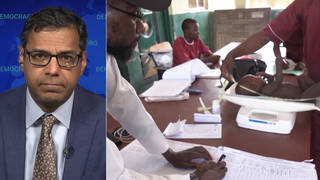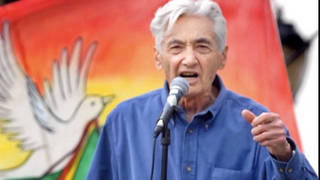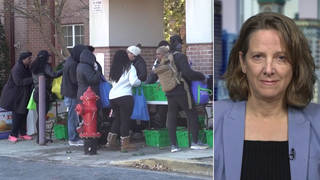
Guests
- Devendra DhunganaNepalese journalist who has worked with the International Trade Union Confederation to interview and translate meetings with Nepalese workers living in Qatar.
Migrant workers account for a staggering 94 percent of the workforce and 80 percent of the population in Qatar, making it the country with the highest ratio of migrants to citizens in the world. Qatar’s migrants come largely from poorer countries in South Asia to labor in the country’s oil and construction sectors or in its restaurants, hotels and homes. Their plight has come to the fore as Qatar hosts the U.N. climate summit and anticipates a burst of construction ahead of the 2022 World Cup. Democracy Now! producer Mike Burke speaks with Devendra Dhungana, a Nepalese journalist who has worked with the International Trade Union Confederation to interview and translate meetings with Nepalese workers living in Qatar. [includes rush transcript]
Transcript
AMY GOODMAN: The march also called for greater protections for migrant workers here in Qatar. Migrant workers account for a staggering 94 percent of the workforce and 80 percent of the population, making Qatar the country with the highest ratio of migrants to citizens in the world. Qatar’s migrants come largely from poorer countries in South Asia to labor in Qatar’s oil and construction sectors or in its restaurants, hotels and homes. Their plight has come to the fore as Qatar anticipates a burst of construction ahead of the 2022 World Cup, which is scheduled to take place here.
Before Saturday’s march, Democracy Now! producer Mike Burke spoke with Devendra Dhungana, a Nepalese journalist who works with the International Trade Union Confederation to interview and translate meetings with Nepalese workers living here in Qatar.
DEVENDRA DHUNGANA: My name is Devendra Dhungana, and I’m with International Trade Union Confederation, ITUC. And ITUC is here as part of the COP18 summit to echo the voice in favor, you know, for the migrant workers, because ITUC is working around the world to protect and promote the rights of the migrant workers. More than 1.2 million workers here are migrant workers. But the problem is, they don’t have the right to organize here. And we are here to make our presence felt and tell the world that the world should not entertain a FIFA World Cup 2022 without the migrant workers’ rights being attested here as part of the global campaign.
What we expect to see is, more people will die of working in the stadiums than the number of players playing in the Qatari stadiums. And can the Qatari government accept to live by that precedent, that more workers will die of the unsafe working conditions here than the number of players playing in the field? It cannot be accepted. And if it was a poor country, there could be any reasons, but Qatar is one of the most richest countries in the world. And it’s the migrant workers who are building the Qatari economy, and the Qatari authority has to accept this and treat the migrant workers with respect and allow them to get organized, because we visited the labor camps, and what we saw was just unbelievable.
MIKE BURKE: Could you describe the living conditions and the working conditions for the migrant workers here?
DEVENDRA DHUNGANA: We went to several labor camps in the Sanaiya area, and we were appalled by the kind of condition we saw. Now, more than 50 migrant workers are living in the 12 to 14 rooms with very little facilities—no running water, no AC in several places. And, you know, as they told us, instead of coming to Qatar to come, they said the living conditions in Qatar are hell. And one of the workers said that they are now—they are the worst-paid workers here. They are worse treated. They don’t get the overtime. They do not have the right to put their views to the management. And most importantly, they do not have any room to put up their issue or complaints to any authority here. And they are just packed up. Their passports are seized by the company, and they cannot allow to return back home. So the workers we talked to were so frustrated, so unhappy, that if the company would not allow their exit visa, then they could die here, dying up like the sardines.
MIKE BURKE: And what can you—what countries are most of these migrant workers from? And what type of work are they doing here?
DEVENDRA DHUNGANA: Most of the migrant workers, especially in the construction sector, are from South Asia, with a high participation from Nepal, India and Pakistan. But mostly, the Nepali migrant workers are facing the worst time, because they are getting the lowest pay. And they are living in very squalid conditions, you couldn’t just believe—17 people living in one room, 50 people sharing one small kitchen, and there’s no fire extinguisher service there, no running water, and 50 people have to queue up in the morning to use one toilet. And it’s just unbelievable how pathetic condition there is in the labor camps. And we saw it with our own eyes. Even the ITUC secretary general, Sharan Burrow, was also there, and she said, “If Qatar is going to hold the World Cup, it should not be without the workers’ rights.” She made it very clear. And, you know, while talking to the migrant workers, they were very much concerned that they felt they were under captivity and a kind of modern slavery was there in Qatar, because their passports were seized by the company, and they will not have the right to return home even in emergency situations, because they are not easily issued the exit papers. And we talked to them, and they said they’ve been here for five years, some of them for seven years, and they said they would like to return home when they wanted to.
AMY GOODMAN: Devendra Dhungana is a Nepalese journalist. He was speaking with Democracy Now!'s Mike Burke in the streets of Doha, Qatar. Qatar, 80 percent of the population here are foreign workers; 94 percent of the workforce are workers from other countries. This is Democracy Now! When we come back, we'll go to Egypt. Stay with us.












Media Options